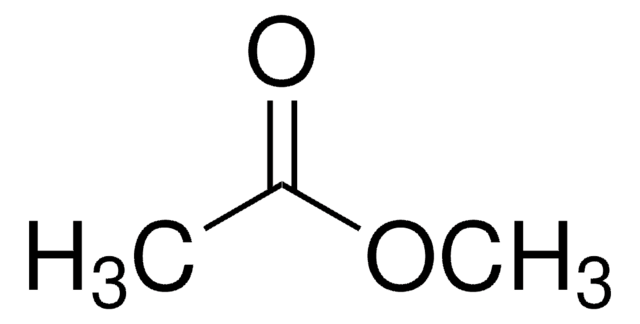About This Item
Recommended Products
grade
analytical standard
Quality Level
vapor density
4 (vs air)
vapor pressure
15 mmHg ( 25 °C)
8 mmHg ( 20 °C)
Assay
≥99.7% (GC)
autoignition temp.
790 °F
shelf life
limited shelf life, expiry date on the label
expl. lim.
7.6 %
technique(s)
HPLC: suitable
gas chromatography (GC): suitable
refractive index
n20/D 1.394 (lit.)
n20/D 1.394
bp
124-126 °C (lit.)
mp
−78 °C (lit.)
density
0.88 g/mL at 25 °C (lit.)
application(s)
cleaning products
cosmetics
environmental
flavors and fragrances
food and beverages
personal care
format
neat
SMILES string
CCCCOC(C)=O
InChI
1S/C6H12O2/c1-3-4-5-8-6(2)7/h3-5H2,1-2H3
InChI key
DKPFZGUDAPQIHT-UHFFFAOYSA-N
Looking for similar products? Visit Product Comparison Guide
General description
Find all available reference materials for compounds listed in 10/2011 here
Application
Signal Word
Warning
Hazard Statements
Precautionary Statements
Hazard Classifications
Flam. Liq. 3 - STOT SE 3
Target Organs
Central nervous system
Supplementary Hazards
Storage Class Code
3 - Flammable liquids
WGK
WGK 1
Flash Point(F)
80.6 °F - closed cup
Flash Point(C)
27 °C - closed cup
Personal Protective Equipment
Choose from one of the most recent versions:
Already Own This Product?
Find documentation for the products that you have recently purchased in the Document Library.
Articles
Butyl methyl ether; Acetic acid; 2-Butanone; Ethyl acetate; Tetrahydrofuran; 1-Butanol; Isopropyl acetate; Heptane; Propyl acetate; 3-Methylbutanol; 4-Methyl-2-pentanone; Isobutyl acetate; Butyl acetate; Dimethyl sulfoxide; Anisole; Cumene
Protocols
Separation of Acetone; Acetic acid; Propionic acid; Ethyl butyrate; Ethanol; Isoamyl acetate; Isobutyric acid; 3-Methyl-2-butanol; Methyl acetate; 1-Propanol; Acetal, ≥98%, FG; 2-Methyl-1-pentanol; Butyl acetate; Ethyl propionate; 3-Pentanol; 2-Pentanol, 98%; Ethyl isobutyrate; Isobutyl acetate; Acetaldehyde; Furfural; Butyric acid; Methanol; Ethyl acetate
Protocol for GC Analysis of Class 3 Residual Solvents on SUPELCOWAX® 10
Our team of scientists has experience in all areas of research including Life Science, Material Science, Chemical Synthesis, Chromatography, Analytical and many others.
Contact Technical Service




